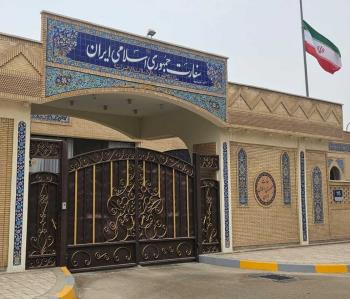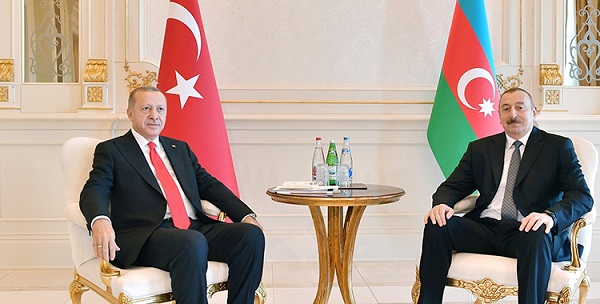Alwaght- Turkish President Recep Tayyip Erdogan traveled to Azerbaijan on Wednesday to meet his counterpart Ilham Aliyev.
The Turkish president took part in the eighth meeting of the Turkey-Azerbaijan High-Level Strategic Cooperation Council. At the end of the meeting, the two leaders signed a closing agreement.
The trip comes while over the past few weeks Erdogan has experienced hard times in the foreign policy. His visit gives rise to a question: What does he seek behind Azerbaijan visit while he is grappling with a set of crises in the region, especially the Idlib crisis?
Four goals could drive this visit:
Decreasing the home pressures caused by regional policy crisis
The first and possibly the most important goal taking Erdogan to Azerbaijan was his aim to alleviate the internal pressures put on him amid crisis hitting his policy in the region. This trip, many agree, was made for home consumption than it can have real foreign policy outcomes for him. In fact, he now understands that his interventionist policy in Syria has pushed him on the brink of a costly and big war the definite result of which is nothing but defeat. On the one hand, Turkey, which has forces in Idlib as the last stronghold of the terrorists, is under pressure of the Syrian government that wants to extend its rule over the northwestern city, held by foreign-backed militants for eight years. On the other hand, in the case of a human mistake in Idlib, clashes between Turkish and Russian forces are unavoidable.
Moreover, Erdogan deployed militants active in Syria to Libya to support Tripoli, the seat of the Government of National Accord (GNA) led by Prime Minister Faez Siraj. The Tripoli-based government is under attacks by warlord General Khalifa Haftar, who is backed in his campaign against the internationally-recognized government by Turkey rivals. Erdogan over the past few days had been under opposition’s fire as he admitted that two Turkish soldiers were killed in Libya clashes. By Azerbaijan visit, Erdogan wanted to move free from the home strains and pave the ground for downscaling of an increasingly intense home atmosphere.
Promoting “one nation, two states” doctrine by politically supporting Azerbaijan
By visiting Azerbaijan, Erdogan also wants to persuade and appease the nationalist forces in Turkey. Over the past decades, Turkish officials have always raised “one nation, two states” idea when they referred to the Turkish-Azerbaijan relationship. They label Azerbaijan the depth of the Turkish influence and undertake as a duty the backing for Baku. Caring for Azerbaijan has been a constant demand of the Turkish nationalists.
In July 2018 and following the shift to presidential system in Turkey, Erdogan chose Azerbaijan as the destination of his visit to, according to analysts, demonstrate his belief in the one nation, two states doctrine. In his Wednesday visit, this doctrine was highlighted in some way. In his joint press conference with President Aliyev, Erdogan said Turkey was ready to solve the Karabakh crisis based on the notion of the Azerbaijan sovereignty and the unity of this country’s territory. This, many argue, leaves no doubt that Erdogan strongly believes in one nation, two states doctrine.
Expanding economic cooperation
One more reason behind Erdogan’s visit to Azerbaijan was the intention to complete the joint projects or launch new ones. Ankara and Baku are engaged in deep cooperation in economy, defense, trade, security, culture, industry, and politics.
During a press conference with Aliyev, Erdogan told of plans to construct railroad connecting Azerbaijan’s Nakhchivan to Turkey. He also talked about a 160-kilometers-long gas pipeline from Iğdir in the eastern Anatolia Region of Turkey to the borders of Nakhchivan, making the Azerbaijani region receiving gas both from Turkey and Iran. Figures published suggest that in 2019, the Turkish-Azerbaijani trade volume touched $4.4 billion. It is planned to surge to $15 billion in 2023.
Preventing the Fethullah Gulen network’s deep influence in Azerbaijan.
The Turkish leader is deeply concerned about deepening toehold of the Fethullah Gulen network of supporters in Azerbaijan. Gulen, a Pennsylvania-based Turkish preacher, is a vocal critic of Erdogan and is accused of masterminding the 2016 failed military coup that sought to oust Erdogan. Especially since 2016, Erdogan considered the activities of the Gulenists as a top home threat to his rule.
Erdogan labeled the Gulenist movement a terrorist entity conspiring against the state. He is now afraid of possible penetration of the Azerbaijan politics and society by the Gulenists and even worse assumption of the rule in Baku. This runs counter to his home and regional strategies and that is why he has reportedly urged Aliyev to take more serious steps to grub out the Gulenists in his country.



























